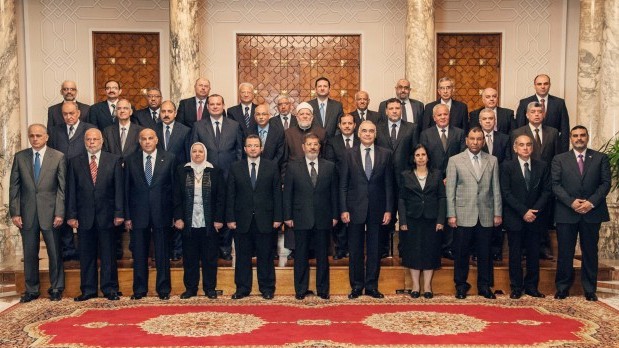
A handout photograph released by the Egyptian Presidency shows Egyptian president Mohamed Morsi (C) posing for a group photograph with his prime minister, Hisham Qandil (5-L), and nine new ministers during a meeting in Cairo. (EPA/EGYPTIAN PRESIDENCY/HANDOUT)
In an exclusive statement to Asharq Al-Awsat, Salafist Al-Nour Party leader Younes Makhioun said: “The cabinet reshuffle announced the day before yesterday in Egypt is a failure by any and all standards.”
He also denounced the move was an example of the “Ikhwanization of the state,” through the appointment of Muslim Brotherhood figures to head various government ministries.
His criticisms were also echoed by the secular opposition National Salvation Front (NSF).
NSF member Refaat Al-Saeed said the latest move was an indication that the Brotherhood intends to commit electoral fraud in the coming parliamentary elections.
“We reject the domination of the Muslim Brotherhood and their control over society, as this cabinet reshuffle puts everything in the hands of the Brotherhood’s guidance office,” he added.
Makhioun told Asharq Al-Awsat that the cabinet reshuffle “will not bring anything new and it will only add to the failure of Hisham Qandil’s government.”
“We in the Al-Nour Party demanded a complete cabinet reshuffle, including the prime minister, for several reasons, such as the need for the government to have a clear strategy and a specific plan so that people can assess its performance, especially regarding issues of security, social justice and the economy,” he said.
Makhioun singled out Prime Minister Hisham Qandil for particular criticism, saying: “The Qandil government has failed to solve even one of the citizens’ daily problems, such as the issue of [the price of] gasoline, fuel and bread,” adding, “It has exacerbated these problems.”
The Salafi leader emphasized, “We believe that a government of national unity should have been formed. This government should work to alleviate the severity of the political crisis by incorporating all political parties—even if the participation is limited to giving opinions—or by forming a technocratic government that is not politically affiliated. But this did not happen.”
Makhioun informed Asharq Al-Awsat that although the presidency had called on the Salafi party to put forward ministerial candidates, they had refused.
“Our demands for a complete reshuffle are based on the hope to form a national unity government that is able to run impartial and unquestionable parliamentary elections. Democracy in Egypt is still emerging and a sense of distrust prevails among most of the political powers,” Makhioun added.
Makhion also warned that the Muslim Brotherhood and its affiliated Freedom and Justice Party risked damaging their own cause, and the Egyptian political system in general.
He said: “Ikhwanization, by consolidating the concept of monopoly, poses a threat to the popularity of the Freedom and Justice Party. We do not want the gap between the different political powers to widen. On the contrary, we would like to bridge that gap.”
Leading NSF member Amr Mousa described the cabinet reshuffle as a new step towards “comprehensive Muslim Brotherhood domination” of the country.
“The reshuffle does not add anything new and it will need to be changed in the short run,” he added.
As for claims of an Al-Nour–Freedom and Justice Party electoral coalition, Makhioun clarified that Al-Nour did not enter into alliance with the Brotherhood’s party in the last elections, adding that candidates from both parties competed in several constituencies, particularly in the run-off voting.
He said: “The two parties may have agreed on some issues in the past, but they also disagreed over others. We have also expressed agreement with some liberal and political factions as well. Our party is an independent party that has an independent vision based on what we think serves the public interest, regardless of what the Brotherhood thinks.”
